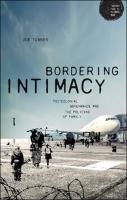Bordering intimacy
Postcolonial governance and the policing of family
Abstract
Bordering intimacy is a study of how borders and dominant forms of intimacy, such as family, are central to the governance of postcolonial states such as Britain. The book explores the connected history between contemporary border regimes and the policing of family with the role of borders under European and British empires. Building upon postcolonial, decolonial and black feminist theory, the investigation centres on how colonial bordering is remade in contemporary Britain through appeals to protect, sustain and make family life. Not only was family central to the making of colonial racism but claims to family continue to remake, shore up but also hide the organisation of racialised violence in liberal states. Drawing on historical investigations, the book investigates the continuity of colonial rule in numerous areas of contemporary government – family visa regimes, the policing of sham marriages, counterterror strategies, deprivation of citizenship, policing tactics, integration policy. In doing this, the book re-theorises how we think of the connection between liberal government, race, family, borders and empire. In using Britain as a case, this opens up further insights into the international/global circulations of liberal empire and its relationship to violence.
Keywords
borders; intimacy; postcolonial; race; feminist theory; empire; violence; family; citizenshipDOI
10.7765/9781526146946ISBN
9781526146960Publisher
Manchester University PressPublisher website
https://manchesteruniversitypress.co.uk/Publication date and place
Manchester, 2020Series
Theory for a Global Age,Classification
Political science and theory
Sociology
International relations
United Kingdom, Great Britain


 Download
Download Web Shop
Web Shop